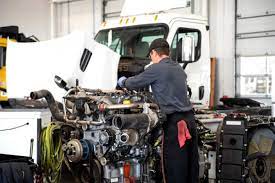Are you fascinated by the power and complexity of diesel engines? Do you enjoy solving mechanical and electrical problems? If so, a career as a diesel mechanic might be the perfect fit for you. Diesel power is used in a wide variety of applications and industries, making skilled diesel mechanics in high demand. In this comprehensive guide, we will explore the skills and training required to become a successful diesel mechanic, as well as the career prospects in this field.

The Importance of Diesel Mechanics
Diesel engines are the backbone of various sectors, including transportation, construction, and infrastructure. For instance, millions of diesel-powered 18-wheelers deliver essential products to retailers and consumers every day. These trucks are often equipped with refrigeration units powered by small diesel engines. Additionally, refrigerated containers are loaded onto trains and ships, which also rely on diesel power. The maintenance and repair of these engines are crucial for ensuring smooth operations and preventing breakdowns.
Furthermore, diesel engines play a vital role in construction sites. Heavy-duty equipment like bulldozers, cranes, and backhoes are powered by diesel engines, allowing them to tackle big jobs efficiently. Moreover, critical infrastructure such as hospitals and airports heavily rely on diesel-powered backup electricity to ensure uninterrupted operations. Diesel mechanics are essential in maintaining these backup generators and ensuring their reliability.The Shortage of Skilled Diesel Mechanics
Despite the increasing demand for diesel mechanics, there is a significant shortage of skilled workers in this field. This shortage can be attributed to several factors, including the retirement of experienced technicians and a lack of new technicians entering the industry. The shortage of skilled workers poses a threat to national economic growth and emphasizes the need for focused training programs.
Training to Become a Diesel Mechanic
To embark on a successful career as a diesel mechanic, it is essential to receive proper training and acquire the necessary skills. While most four-year colleges do not offer specialized diesel mechanic programs, accredited trade schools provide focused training in this field. These trade schools offer comprehensive programs that can be completed in 13 to 15 months, allowing students to quickly enter the workforce.
Skills Needed to Excel as a Diesel Mechanic
Becoming a skilled diesel mechanic requires a combination of mechanical and electrical knowledge, hands-on experience, and problem-solving skills. Let’s explore the key areas of knowledge that a diesel mechanic must develop:
1. Diesel Power Cycle & Drivetrain
A diesel mechanic must possess a deep understanding of the diesel power cycle and drivetrain systems. This includes comprehending how power is transferred through clutches, manual transmissions, or automatic transmissions to the final drive. The ability to diagnose issues within the drivetrain and repair components from the diesel engine to the drive wheels is crucial.
2. Diesel Engine Control Diagnostics
Modern diesel-powered machines rely on electronic engine control systems. Diesel mechanics must have a solid grasp of these systems, which control fuel injection, ignition, and diagnostic checks. Proficiency in working with complex on-board computer networks is essential for diagnosing and repairing electronic engine control systems.
3. Air & Hydraulic Braking Systems
Ensuring the safe operation of large trucks requires expertise in air and hydraulic braking systems. Diesel mechanics must understand the theory and operation of these systems as they apply to medium-heavy and duty transport vehicles. Diagnosing and repairing these large and complex systems correctly is a critical skill for a diesel mechanic.
4. Vehicle Electrical Systems (Including AC & Accessories)
Diesel mechanics need to develop practical knowledge in basic and solid-state circuitry, including vehicle electrical systems, automotive storage batteries, charging systems, starting systems, and lighting systems. They should be proficient in diagnosing and repairing electrical components using both conventional and electronic diagnostic equipment.
5. Welding Skills
Diesel mechanics are often called upon to perform welding procedures on vehicle frames or bodies. Competency in welding is an essential skill for diesel mechanics, as it allows them to repair and reinforce various parts of a vehicle.
Additional Information:
It is worth noting that as the world moves towards a more environmentally-friendly future, knowledge of alternative fuel systems like Compressed Natural Gas (CNG) is becoming increasingly important. Diesel mechanics who receive training in alternative fuels will be well-positioned to take advantage of the changing industry landscape.
Finding the Right Diesel Mechanic Training Program
Choosing the right training program is a vital step towards a successful career as a diesel mechanic. Look for accredited trade schools that offer comprehensive diesel mechanic training. These programs should include a balance of theoretical knowledge and hands-on experience under the guidance of experienced ASE-certified diesel instructors.
By enrolling in a reputable diesel mechanic training program, you can gain the skills and knowledge necessary to excel in this field. Additionally, completing a focused training program at a trade school can save you from the burden of high student debt often associated with four-year college degrees.
Career Prospects for Diesel Mechanics
With the growing demand for diesel mechanics and the shortage of skilled workers in the field, the career prospects for qualified individuals are promising. Skilled diesel mechanics can find employment in various industries, including transportation, construction, manufacturing, and service centers. Additionally, the essential nature of diesel-powered equipment ensures job security and stability in the long run.
Conclusion
Becoming a skilled diesel mechanic requires dedication, training, and a passion for working with complex machinery. By acquiring the necessary skills in diesel power cycles, drivetrain systems, engine control diagnostics, braking systems, vehicle electrical systems, and welding, you can position yourself as a valuable asset in the industry. Trade schools offer specialized training programs that can equip you with the knowledge and hands-on experience needed to excel in this field. Embrace the opportunity to become a skilled diesel mechanic and embark on a rewarding career that meets the demands of the ever-growing diesel industry.




No comments! Be the first commenter?